牛津上海版初中英语各单元知识点
初中英语 牛津上海版九年级上Unit2知识点及语法点

初中英语牛津上海版九年级上Unit2知识点及语法点U2常考短语:1.paper cutting - 剪纸2.set off - 出发3.after dark - 天黑后,黄昏后4.all the time - 一直,始终5.up to - 到达(某数量、程度等);至多有6.up and down - 起伏,上下波动7.no more - 不再,再也不8.tie。
around - 拴……在……周围9.cut out - 剪成10.in the shape of - 以……的形状11.put on - 穿上;上演12.close to - 靠近13.put up - 张贴14.a piece of - 一片,一条15.after dark - 天黑后知识讲解及拓展ed to & be used to doing & be used to doUsed to do sth: 过去常常做某事Be used to doing: 惯于Be used to do: 被用于。
可用于过去,现在,将来等时态可用于任何时态=be used for doingEg: 1--How is your grandma。
--She is fine。
She used to watch TV at home after supper。
But now she is used to going out for a walk.A。
watch。
goB。
watching。
goC。
watching。
goingD。
watch。
going2.Bamboo can be used to make paper.2.although - 虽然,尽管与though同义,用来引导让步状语从句。
不能与but同时出现在句子中。
Although比较正式,常用于句首;though多用于非正式文体,表示强调。
Eg: --The boy can speak both English and Japanese。
牛津上海版初中英语各单元知识点
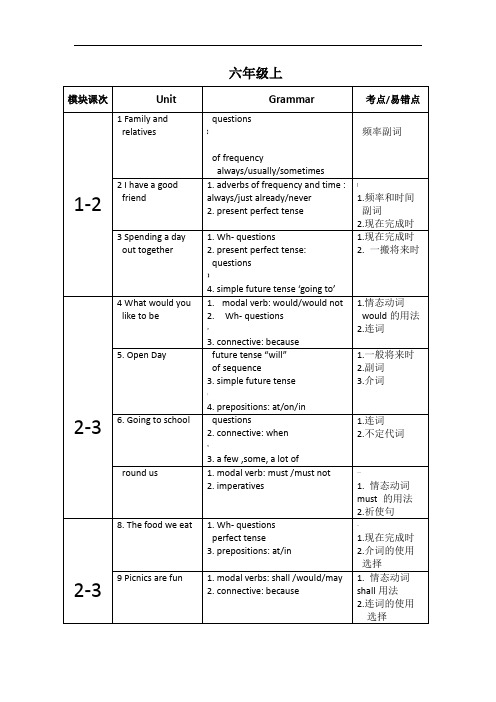
六年级上
;
重点:介词:at, on, in,情态动词:would, must, shall,一般将来时,现在完成时,不定代词:a few, some, a lot of
六年级(下)
一.共分为11个单元,各单元内容为:
六年级下
重点:情态动词用于情景交际,介词:for, if, with, from,there be句型,一般将来时。
七年级(上)
一.共分为11个单元,各单元内容为:
七年级上
;
重点:祈使句,方位介词,副词,现在完成时,so/neither句型
七年级(下)
一.共分为11个单元,各单元内容为:
七年级下
重点:介词的使用,代词:物主代词,反身代词,形容词,现在完成时
八年级(上)
一.共分为7个单元,各单元内容为:
八年级上
重点:一般过去时,可数不可数名词,基数词,序数词,过去分词作状语
八年级(下)
一.:
一.共分为7个单元,各单元内容为:
八年级下
重点:连词and but so的使用,状语从句,宾语从句,should/ought to句型,情态动词的用法,现在进行时
九年级(上)
一.共分为7个单元,各单元内容为:
九年级上
重点:不定式的用法,形容词副词的比较级,现在完成时
九年级(下)
一.共分为5个单元,各单元内容为:
九年级下
重点:定语从句,状语从句,间接引语,过去进行时,过去完成时。
沪教牛津版英语七年级上册单元知识点一览表

address、(be) famous for、department store、prefer to、go on holiday、go sightseeing
1、情态动词can,may,must的学习与运用
单元标题
页码范围
Module 4 Colourful life ( P87-116 ) 单元重点词汇
单元语法点分析
7 Poems
P87-102
poem、ordinary、feeling、order、advice、aloud、group、agree、disagree、*rhyme、 complete、well、shower、*site、narrow、height、superman、seller、smile、rush、 1、祈使句和感叹句的学习和运用
person、cheerful、hard-working、patient、smart、probably、forget、smell、care、 miss、joke、laugh、remain、strict、encourage、support、successful、member as well、take care of、make fun of、(be) strict about、give up、go to work
1、量词词组的学习与运用 2、How much和How many的学习与运用
6 Electricity
P71-86
牛津沪教版英语七年级下重点知识复习
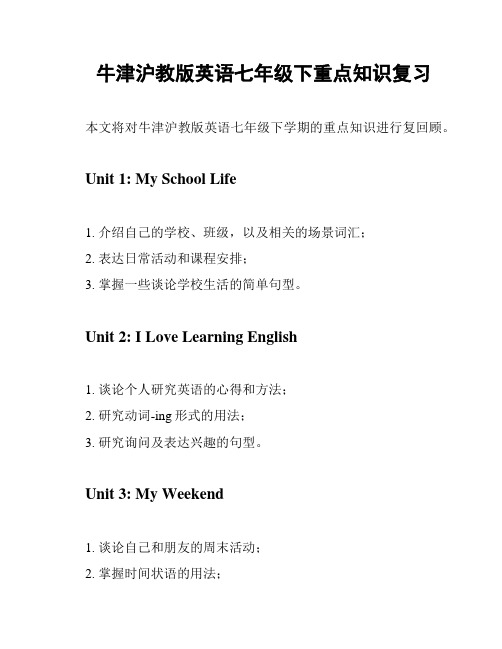
牛津沪教版英语七年级下重点知识复习
本文将对牛津沪教版英语七年级下学期的重点知识进行复回顾。
Unit 1: My School Life
1. 介绍自己的学校、班级,以及相关的场景词汇;
2. 表达日常活动和课程安排;
3. 掌握一些谈论学校生活的简单句型。
Unit 2: I Love Learning English
1. 谈论个人研究英语的心得和方法;
2. 研究动词-ing形式的用法;
3. 研究询问及表达兴趣的句型。
Unit 3: My Weekend
1. 谈论自己和朋友的周末活动;
2. 掌握时间状语的用法;
3. 掌握一些听力技巧。
Unit 4: Jobs
1. 研究表示职业的词汇;
2. 表达及询问个人志愿和理想。
Unit 5: Food and Drink
1. 研究食物和饮品的词汇;
2. 掌握询问及表述食物喜好和不喜好的方法。
Unit 6: Sports and Hobbies
1. 研究表示不同体育项目和爱好的单词;
2. 表达及询问个人感受和喜好。
Unit 7: Travelling
1. 谈论旅游的相关话题;
2. 表达和询问喜欢或不喜欢旅游的理由和偏好。
Unit 8: Festivals and Celebrations
1. 研究表示节日和庆祝活动的单词;
2. 谈论家庭或朋友间的庆祝活动。
总结
以上是牛津沪教版英语七年级下学期的重点知识复习,希望对大家的英语学习有所帮助。
牛津上海版英语八上各单元知识梳理

牛津上海版英语八上各单元知识梳理Unit 1 Penfriends ⅠWords: 1. penfriend 笔友pen pal2. magazine 杂志 a literary magazine 文学杂志women’s magazine 妇女杂志→n. magazinist 期刊编辑3. hobby 业余爱好4. chess 国际象棋chessman 棋子(pl. chessmen) chessboard 棋盘5. own 拥有own up 承认错误owner 所有者物主业主6. good/well—better---best7. architect 建筑师architecture 建筑学8. nearby adv. 在附近不远adj. 附近的邻近的9. keen adj. 热心的渴望的敏锐的灵敏的Keenly adv.敏锐地keenness n. 敏锐10. ambition 雄心抱负be full of ambition 野心勃勃ambitious adj. 有雄心的11. enclose 附上ⅡPhrases 1. at the end 在………的末端2. be keen on 热心于做热衷于………3. play chess 下象棋4. twelve years old5. a boy called Tom 一个名叫Tom 的男孩a boy named Tom a boy with the name Tom6. best wishes 最好的祝愿7. by +交通工具= take +a/an +交通工具8. tell sb. about sth. 告诉某人关于某事tell sb. to do sth. 告诉某人做某事tell sb. not to do sth. 告诉某人别做某事9. enjoy doing sth. 喜欢做某事like doing sth. mind /practice/finish/10. speak /tell /say/talk say 说述说speak 说话发言电话来时用speaking talk 说谈话of/about tell 告诉讲述ⅢSentence 1. make it +adj. for sb. to do sth. it 形式宾语2. sth. +be+ to do 动词不定式做表语3. I hope you will write to me soon . 我希望你尽快给我回信hope 有可能实现的愿望wish 不大可能实现的愿望hope to do 希望做某事wish sb. to do 希望某人做……..ⅣGrammar Ⅰquestion words (疑问词) what、who(whom) / whose/which/when/where/how/why how many/much/long/far/soon/fast/often/ how many timesⅡ冠词 1.不定冠词a/an的用法“不见“原因”(发元音)别施“恩”(an)特殊案例:前需要加a 的:university a usual book Europe 欧洲European 欧洲人one-day trip 需要加an 的:unhappy + n. uncle unusual + n.2. 定冠词the的用法特指双方熟悉,上文已经提起。
牛津上海版初一英语知识点总结

牛津上海版初一英语知识点总结第一篇:牛津上海版初一英语知识点总结牛津上海版初一英语知识点总结牛津上海版英语词组及短语(中英对照版)1.在左上角2.在右上角3.下棋4.笔友5.和某人住在一起6.担任……工作7.在学校8.在中间9.最美好的祝愿10.戴着眼镜的那个女孩子11.在右边12.在左边13.在学校的足球队里14.一年级,二班15.女子篮球队16.男子接力比赛17.在世界上18.全世界19.在……旁边20.对……友好21.热衷于……22.擅长于……23.语文24.数学25.地理26.生物27.历史28.化学UNIT1—4at the top-left corner at the top-right corner play chesspenfriendlive with somebobywork as at schoolin the middlebest wishesthe girl in glasseson the righton the lefton the school football teamClass Two,Grade Onegirls’ basketball teamboys’ relay racein the world all over the worldnext to / besidebe friendly to be keen onbe good atChinesemathsgeographybiologyhistorychemistry29.体育P.E.30.音乐music 31.政治politics 32.物理physics 33.少先队员Young Pioneer 34.小学pramay schol 35.初中middle school/junior high school 36.高中senior middle school 37.大学university/ college 38.做运动do exercise 39.做眼保健操do eye exercises 40.做早操do morning exercises 41.照相take pictures/photos 42.喜欢做某事like/enjoy doing sth.43.想要做……want to do sth./ would like to do sth./ 44.注意……pay attention to 45.写下,记录下write down 46.从左边/右边from the left/right 47.收到某人的来信hear from sb.;get/receive a lettere from sb.48.锻炼身体do sports 49.持续一段时间last for 50.一两个小时one hour or two/ one or tow hours 51.在街道上in the street 52.在……的开始at the beginning of 53.在……的结尾at the end of 54.保安guard 55.建筑工人construction worker 56.牙科医生dentist 57.会计师accountant 58.去游泳go swimming 59.去海边go to the sea 60.去滑雪go skiing 61.去滑冰go skating 62.去购物go shopping 63.去观光go sightseeing 64.去远足go hiking 65.去跑步go running 66.去慢跑go jogging 67.去跳舞do dancing 68.去航行go sailing 69.去约会70.到达(4种表达方法)arrive in/at;reach;get to 71.花费时间(金钱)的表达方法: sb.spend…on sth./sb.spend...(in)doing sth./ sb.pay…for stth./ sth.cost sb.some money/ it takes sb….to do sth.72.主管be in charge of 73.照顾look after/take care of 74.独生子女the only child 75.开会have a meeting 76.迟到be late for 77.除……之外except/ except for 78.从周一到周五from Monday to Friday/ on weekdays 79.刷牙brush the teeth 80.洗脸wash face 81.追赶(某人)go after sb./ run after sb.82.及时in time 83.按时on time 84.盯着、凝视stare at 85.跑开run away 86.下车get off(the bus)… 87.上车get on(the bus 88.捡起pick up 89.思考think about 90.匆忙in a hurry 91.从……冲出来strom out of/ rush out of 92.熬夜stay up late 93.生某人的气be angry with sb 94.在……的一边on the side of 95.在……的另一边on the other side of 96.等候wait for 97.拿出hold out/ take out 98.跌倒fall over 99.戴着手铐in handcuffs 100.四处走走go/walk around 101.找出,查明find out 102.说谎tell a lie 103.立刻in a flash/ at once/ right away/immediately 104.将来in the future 105.在意、关心care about 106.查询(生词)look up 107.四处看look around 108.有一个选择have a choice 109.正在那个时候at that moment 110.毫无疑问地without question 111.走到跟前、走近come over 112.改变注意change one’s mind 113.尽可能快as soon as possible 114.有时间玩乐have time for fun 115.在……顶部on the top of… 116.或……或……either……or…… 117.既不……也不……neither……nor…… 118.不仅仅……而且……not oly… but also… 119.将……与……比较(将……比作) compare with/ compare toUnit 5---Unit6重点词组Unit 5 1.灭绝;消失die out 2.因……而死die of 3.得知,获悉learn about 4.和……一样the same as 5.因…而著名be famous for 6.同时at the same time 7.以……为基础be based on 8.充满……be full of 9.根据according to 10.依(某人)之见in one’s opinion 11.因为;由于because of 12.超过more than/ over 13.同类的 of this kind 14.做(某事)有一些困难have difficulty with sth./ have difficult in doing sth./ find it difficult to do something.15.全世界范围内all over the world 16.其余的;剩下的the rest of…… 17.既不…也不…neither ……nor…… 18.对……有用处be useful for 19.一等奖the first prize 20.害怕……be a fraid of…… 21.至多有up to 22.生育give birth to…… 23.也;还as well as 24.……方面的专家expert on…… 25.完全地,彻底地competelyUnit6一、词组1.能够be able to / can 2.成为现实;实现come true 3.从现在起from now on 4.到达arrive at/in;get to………;reach…… 5.生病get sick 6.一会儿in a moment/minute 7.和平地in peace 8.破碎地in pieces 9.在太空in space 10.将来in the future 11.降落于……land on 12.看起来像look like 13.部分part of 14.而不是15.耗尽;用完not …but…run out ofUnit 7--8词组:1.从现在起from now on 2.躺下lie down 3.入睡fall asleep 4.从(某地)逃走5.太……以致于……6.过了一会儿7.逃离8.对准;瞄准9.熄灭10.广播、公布11.听起来象12.从……出来13.告诉……实情14.生气15.事实上16.开……的玩笑17.给……提供某物18.过着幸福的生活19.过着艰苦的生活20.过去常常做(某事)21.过去常常不做(某事)22.数以亿计23.除……之外,还……按时24.全世界25.给某人拍照26.例如27.在过去28.广交朋友29.在周末30.赶快31.立刻escape fromtoo…to…;so…that…moments laterbe out of……aim at…go uoutput outsound likecome out oftell the truthbe angry withsb./ get angry in factpaly jokes onprovide……with…live a happy lifelive a hard lifeused to do sth.didn’t use to do sth.billiions ofas well asall over the worldtake photo for …for examplein the pastmake a lot ofat the weekendhurry upin a second/at once/right away/immediately32.考虑think of 33.中国出口品交易Chinese Export Commodities Fair第二篇:上海牛津英语4AM1知识点总结.M1U1 Meeting new people 1.词汇:classmate 同学schoolmate 校友deskmate 同桌friend朋友 meet 遇见people人们eleven 十一twelve十二thirteen 十三fourteen 十四fifteen 十五sixteen 十六seventeen 十七eighteen 十八nineteen 十九twenty二十student number 学号sit 坐skip跳绳live居住near在……附近year年well好mask 面具2.词组:my classmate 我的同学go to the park 去公园ride a bicycle骑自行车 skip a rope 跳绳live near the school住在学校附近walk to school走路去学校play basketball 打篮球like reading喜欢阅读years old 岁—Nice to meet you!很高兴遇到你!—Nice to meet you,too.我也很高兴遇到你!See you!再见!3.语法:形容词性物主代词his,her,your,my,its,their,our 形容词性物主代词(所有格后必须加名词。
牛津上海版初中英语各单元知识点

牛津上海版初中英语各单元知识点.六年级上UnitGrammar考点/易错点模块课次1.How questions 1 Family and2.Wh-questions频率副词relatives3.Adverbs of frequencyalways/usually/sometimes2 I have a good 1. adverbs of frequency and 1.频率和时副time : always/just already/neverfriend1-22现在完成2. present perfect tense13 Spending a day1. Wh- questions 现在完成2.一搬将来out together2. present perfect tense:3.How questions4. simple future tensegoing t1modal verb: would/would not4 What would you1情态动woul 的用like to be?2. Wh- questions2连3. connective: because1一般将来5. Open Day1.simple future tense2副wil2.adverbs of sequence介33. simple future tense4. prepositions: at/on/in2-36. Going to11.How questions连22. connective: whenschool不定代3. a few ,some, a lot of7.Rules round us1. modal verb: must /must not1.情态动2. imperativesmust 的用2祈使8.Thefoodweeat1. Wh- questions1现在完成2介词的使2.present perfect tense选3. prepositions: at/in9Picnicsarefun1. modal verbs: shall1.情态动shal用/would/may2连词的使2. connective: because2-3选1. a little, some, plenty of,1不定代10.Healthya lot of 2.eating形容词比较级2. adjectives to make情态动词comparisons 3.should用法3.modal verbs: should/shouldnot1.名词短语's make a 1. noun phrases 11.Let2.副词pizza 2. adverbs of sequence3.方位介词3. prepositions:below/above/on/inwould, must, shall:at, on, in情态动词:介词,,重点:oflot a :a few, some, 不定代词 ,一般将来时,现在完成时六年级(下)个单元,各单元内容为:. 共分为11一六年级UnitGrammar考易错模块课1.Greatcitiesin1Ho questions1注意语2Asia2preposition: by副3gerund: like/enjoy/love doing4adverbs to show position12. At the airport1preposition: in, for in,forpresent perfect tense22modal verb: would13.DragonBoat22-3prepositions: with, withoutFestival3connective: but交42介: with3用选W-questions1注意语14. Staying healthyHowquestions22connective: because用选3adverbsofdegreeand34频率副frequencyadjectives to describe peopleWhat5.11beIwill2-3simple future tense 2. like? 时词动态情2.modal verb: have to 3.用于情景4.adverbs of sequence交际副词3.情态动词用于modal verb: must 6. Seasonal 1.many, not many 情景交际changes 2.connective: because 3.词容1.pronouns to show quantities 1.形7. Traveling innot 和2.adjectives to make many Garden City用的 comparisons man 3simple future tense2 18. Windy weather1connective: whenverbs:can,may,用选2modalshould23adverbs of manner交19. Sea water and1connective: if用选rain water2preposition: byif 介词2from介词10. Forests and1preposition: from1adjectives to describe objects2形容land2111.Controllingmodal verbs: may, must1fire2there be交near,3prepositions:outside,beThere on2句型:主一3 置的描述情态动词用于情景交际介词:for, if, with, from,重点:,there be句型,一般将来时七年级(上)个单元,各单元内容为:11 一. 共分为七年级上模块课UnitGrammar考点/易错点次1.1.Relatives in 比较形容词 1.adjectives to make parisons 方位名词和Beijing方位副词 2. nouns and adverbs to showposition3. How questions祈使句1.Wh-questions 2.Our animalfriends2.How questions3. imperatives1-23.Friends from1nea1.prepositiofar方位介other countries现在完成away from22.Wh-qquestions3.present perfect tense4.Jobs people do1. Wquestions1.注意语22.Yes/No questions一般现在3.simple present tense一般过去34.simple past tense 5.Choosing new1祈使1.imperativesflat22.prepositions of position方位介2-36. Different places1.there b1.there be2.Wh- questions现在进行23.present continuous tense3连4.connectives:when /because7. Signs around us情态动1.modal verbs:can/must(not)2.Wh-qestions8.Growing1. s/neithe1.so.../healthy,growing2.connective: if句neither..strong2连if3. modal verb: used to情态动4.quantifiers to describe数量4amounts9.International1一般过去1.Wh-questionsFood Festival2. How questions.祈使2-33. simple past tense4. imperatives1o.A1.simple future tensbirthday1一般将来 going t2副party2. adverbs of sequence3情态动3. modal verb: would like疑问句1.Wh-questions11.My food project2. How questions祈使句方位介词现在完成时,句型 so/neither,副词,,重点:七年级(下)个单元,各单元内容为:. 共分为11一七年级模块UnitGrammar 考易错11.Writingatravel1. Wh-questionsguide于情景交2.modal verb: can3.connective: if连词的使2.i2.Going1介toseea1.prepositions:into,alongfilm2.so.../neither...2.so.../2-neither..句3.A visit to Garden1. prepositions:for,since1介词的使City2.present perfect tense现在完成24.Le 介词短语1s go shopping1.prepositional phrases and adjectives to describe objects述形容2.simple present tense一般现在25.WhatcanweConnective: althoughlearnfrom1连词的使others?6. Hard work for a1.adjectives to describebetter lifeevents1描述形容2.start doing1-.一般将来7. In the future1.simple futuretensewil2.agreement and disagreement个人观点2赞同与1.modal verb: would8.A情态动1more2.reflexive pronouns to identify2enjoyableschool peoplelife使1.adjectives to make1描述、比9. The wind iscomparisons and describes形容blowingpeople2.副1-232. adverbs of sequence物主代词3. pronouns to identify使possessions1.连词10. Water Festival1.connective: when2.祈使句2.imperatives3.方位介词3.prepositions: near,at1.Wh-questions 注意陈述语序11. Electricity2. How questions代词:物主代词,反身代词,形容词,重点:介词的使用,现在完成时八年级(上)个单元,各单元内容为:. 共分为7一八年级模块UnitGrammar易1W1Asking Wh-question句1.Penfriends22Asking How-questionHo句3a/a3Using a and an1The simple past tense12.Work and playadverbialand2Adverbs22phrases of frequency和副3. Trouble1The simple past tense12Adverbialphrasesforthepast2作状1Cardinalandordinal4.Numbers1numbers序数Decimals and fractions22statements3Instructions andabout number31-25.Encyclopaedias11Countableanduncountablenouns可不和数ing another 名词and (the)otheranother2.the /other/的运other用来般6.Nobody wins 11.将The simple future tense 1.一adverbial 时Adverbs2.and来示将phases for future 2.表和副词的副词短语位方7. Nobody wins 21.示1.表Preposition of location 1-2的Using some and any2Using somebody/someone/sh3some/an2的使Somebody3someone/smething一般过去时,可数不可数名词,基数词,序数词,过去分词作重点:状语八年级(下)个单元,各单元内容为:共分为7一.八年级模块UnitGrammar易现在进行1.TressThe present continuous tense.对a2.WaterlotTalking about amountsof/afew/alittle/notmany/none/m2的考ch3. Electricity1.modal verbs情态动12.can must maytell/hope/noti3.object clausese/agre的用1.modal verbs1should/oug4.Newspaper2.should,ought tot to句3.objects clauses宾语从22ing pronouns 5.Magazine 名词的运用1.2.Adverbial clausesarticle状语从句.and 连6.Travel词Using conjunctions: and, but,so1. but so 的使用的使the /a /an用 1.who/ing who and whose 7.Poemsing mine yours,his hers ours 的用法2mine/hie/her 2.theirsing one and ones s/ours/their等物主代词用3one/one用法状语从句,宾语从句,的使用,重点:连词and but so现在进行时句型should/ought to,情态动词的用法,九年级(上)个单元,各单元内容为:. 共分为7一九年级模块UnitGrammar易Ancient GreeceThe present perfect tense(句型转换考2-32. TraditionalPassive voice被动语态(型转换易考skills1Passive voice3. PetsUsing adverbs2Comparison of adjectives1形容词和副4. Computer Comparison of adverbs2的比较级(殊形式的二易考5. The human不定式的用Using infinitives 2-3brain做it(式主语的句易Using infinitives6. Detectives Using adjectives形容词的使用7. Escaping fromkidnappers形容词副词的比较级不定式的用法重点:,现在完成时,九年级(下)个单元,各单元内容为:5一. 共分为九年级模块UnitGrammar 易状语从句(the1SavingUsing(not)as…asto1.compare things型转换易考Earth2Adverbial clauses33Verbs with-ing2. Life in theThe past continuous tense过去进行future3. Going places The past perfect tense过去完成4. All about films间接引语(Reported speechand TV点5. A story byRelativeclauseswithwho,thaWhthat3Mark Twainwhaor which关系(定语典句(提分项)定语从句间接引语过去进行时过去,重点:,状语从句,,完成时.。
上海牛津英语中考各专题必背知识点与重难点解析

名词【高频考点】常见不可数名词Bread, fun, information, knowledge,money,news, weather, wealth,wo rk如:_____ information you are giving to us!A.What useful A.What an usefulA.What a useful D.How useful【必背知识点】兼可数和不可数的名词orange 桔子/橘子汁fish 动物鱼/鱼肉(食物)chicken 动物鸡/鸡肉(食物)exercise练习/锻炼glass 玻璃杯,眼镜/玻璃(材料)paper 文件,试卷/ 纸张(材料)life 生命/生活room 房间/空隙(=space)(左为可数释义,右为不可数释义)【必背知识点】名词前的修饰词:①放在可数名词复数前的有:many(许多), few(很少), a few(一些), a (small/ large) number of (许多),several(几个),a couple of(几个)②放在不可数名词复数前的有: much(许多), little (很少), a little(一些),a great deal of, a small/ large amount of;③(可数、不可数前)都可放的词有:a lot of ,lots of(许多), some (一些)any , plenty of区分:a lot 相当于very 表示“很,非常”,后面不能加名词;a lot of表示“很多”,后面加名词。
A number of表示“一些”,the number of 表示“…的数量”,前者谓语用复数,后者谓语用单数。
名词所有格's 表示“某人家”、“店铺”,省略后面的名词eg : at Mr. Green’s, to my uncle’s , at the doctor’s, at the tailor’s冠词【常考易错点】(必须记牢)A useful/ university/ European/one-eyed/+名词;a uniform/ unit/ used caran hour unusual(否定前缀)an + honest/ 8-year-old+名词【难点】冠词a/an在序数词前,表“又一”=anotherHe didn’t give up and took a seventh try.【必背知识点】the在序数词和形容词最高级前。
上海牛津英语知识点及语法重点
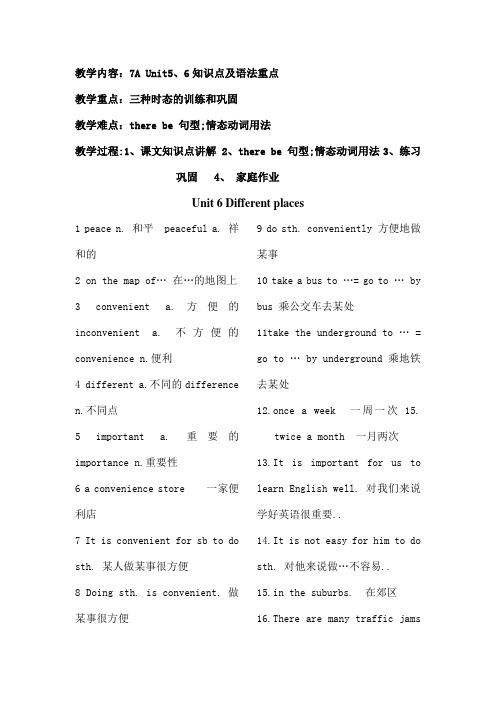
教学内容:7A Unit5、6知识点及语法重点教学重点:三种时态的训练和巩固教学难点:there be 句型;情态动词用法教学过程:1、课文知识点讲解 2、there be 句型;情态动词用法3、练习巩固 4、家庭作业Unit 6 Different places1 peace n. 和平 peaceful a. 祥和的2 on the map of…在…的地图上3 convenient a.方便的inconvenient a. 不方便的convenience n.便利4 different a.不同的difference n.不同点5 important a. 重要的importance n.重要性6 a convenience store 一家便利店7 It is convenient for sb to do sth. 某人做某事很方便8 Doing sth. is convenient. 做某事很方便9 do sth. conveniently 方便地做某事10 take a bus to …= go to … by bus 乘公交车去某处11take the underground to … = go to … by underground 乘地铁去某处12.once a week 一周一次15.twice a month 一月两次13.It is important for us to learn English well. 对我们来说学好英语很重要..14.It is not easy for him to do sth. 对他来说做…不容易..15.in the suburbs. 在郊区16.There are many traffic jams有许多交通堵塞..at the bottom of some steep steps 在陡峭的台阶下面on top of the mountains 在山顶relax oneself 自我放松17. please v. –pleasant a. – pleased a. 取悦;使愉快–令人愉快的–感到愉快的18. please sb. 取悦某人;使某人高兴19. the changes to the lives 生活中的变化20. life in different seasons 不同季节的生活21. seasonal changes 季节的变化22. falling leaves 落叶23. fall -- fell – fallen 落下24. This pair of gloves is black. 这副手套是黑色的..25. The gloves are black.这手套是黑色的..26. What season is it 是什么季节27. in different places 不同的地方be different from …/ the same … as…differences between … and …28.It is + adj + to do sth 做…很…29. once a week 一周一次twice a week 一周两次 three times a week30. noise n. 噪音noisy adj. 嘈杂的noisy; noisier; noisiest31. exciting adj. 令人激动的/excited adj. 感到激动的excite v. 使激动;使兴奋excitement n. 激动;兴奋32. pleasant adj/ 使人愉快的please v. 使高兴 pleased adj. 高兴的;be pleased with sth 对…感33. leaf n. 树叶 leaves pl.到满意的pleasure n. 高兴;愉快 It’s my pleasure.1 现在进行时的用法一、选择题1. Who _____ over there nowA. singingB. are singC. is singingD. sing2. It’s eight o’clock. The students _____ an English class.A. haveB. havingC. is havingD. are having3. Listen The baby _____ in the next room.A. cryingB. criedC. is cryingD. cries4. Look The twins _____ new sweaters.A. are wearingB. wearingC. are wearD. is wearing5. Don’t talk here. Grandparents _____.A. is sleepingB. are sleepingC. sleepingD. sleep6. Tom is a worker. He _____ in a factory. His sisters _____in a hospital.A. work/ workB. works/ workC. is working / are working7. Who _____ English best in your classA. speakB. speaksC. speaking8. Mrs Read _____ the windows every day.A. is cleaningB. cleanC. cleansD. cleaning9. We _____ music and often _____ to music.A. like/ listenB. likes/ listensC. like/ are listening10. She _____ up at six in the morning.A. getB. getsC. getting11. On Sunday he sometimes _____ his clothes and sometimes _____ some shopping.A. wash/ doB. is washing/ is doingC. washes/ does12. The twins usually _____ milk and bread for breakfast; but Jim _____ some coffee for it.A. have/ haveB. have/ hasC. has/ haveD. having / having二、填空:1. My father always __________come back from work very late.2. The teacher is busy. He __________ sleep six hours a day.3. Listen Joan __________sing in the classroom. She often__________ sing there.4. Where __________ you __________ have lunch every day5. The girl __________like wearing a skirt. Look She __________weara red skirt today.2 掌握when引导时间状语从句的用法3 学会运用because引导的原因状语从句4 there beThere be 句型用法总结There be 结构是英语中陈述事物客观存的常用句型;表示“有”;其确切含义是“存在”there作为引导词;本身没有意义;用动词be的某些形式作为谓语动词;它的主语是用一些表示泛指或不定特指的名词词组;动词be和主语的数必须一致..句子最后通常为表示地点和时间的状语..因此要表达“某个地方或某个时间存在什么事物或人”的时候常用“There be + 名词+ 地点时间这一句型..例如:There is a great Italian deli across the street.穿过街道;有一家大的意大利熟食店..There are some students in the dormitory.在宿舍里有一些学生..一、There be 结构中的主谓一致1.当动词be后所接的名词是单数可数名词或不可数名词时;be 应该取单数is;当其后所接的名词是复数的可数名词时;be用复数are..There's a man at the door.门口有个人..There is some apple juice in the bottle.瓶子里有些苹果汁..There are some strangers in the street.大街上有一些陌生人..2.如果There be 后面是几个并列名词做主语时;动词be的形式和最靠近它的那个名词保持数的一致..There is an ashtray and two bottles on the shelf. 架子上有一只烟灰缸和两个瓶子..There are two bottles and an ashtray on the shelf. 架子上有两个瓶子和一个烟灰缸..二、There be 结构中的时态1.There be 句型中动词be可以有一般现在时、一般过去时、将来时和完成时..There is no harm in trying.不妨一试..There were fabulous wildflowers in the hills last spring.去年春天;山中有极美的野花..There will be a fine day tomorrow.明天将是一个晴天..There have been several private schools in our area this year. 今年;我们这里已经有好几所私立学校了..2.There be 句型可以和各种助动词、情态动词连用..There may be a cigarette in that box.那只盒子里或许有支香烟..There must be some cakes on the table.桌子上一定有些蛋糕..There used to be a hospital there before the war.战前;那里曾经有家医院..3.There be 句型也可以和这样一些的谓语动词连用:be going to 、seem to 、appear to 、usedto、be likely to 、happen to ….There seem to be a few trees between me and the green.在我与草坪之间好像有一些树..There is gong to be a meeting tonight.今天晚上有个会议..There is likely to be a storm.可能有一场暴雨..There happened to be a bus nearby.碰巧附近有辆公交车..There appears to have been a nasty accident.似乎发生了一起严重事故..4.there be 结构中除可以用be 外;还可以用其它动词..例如:There came a scent of lime-blossom.飘来一阵菩提树的花香..Once upon a time there lived a king in China.从前中国有一个国王..三、There be 句型的否定句、一般疑问句、特殊疑问句和反意疑问句1.There be 句型的否定句有两种构成方式;一种是将否定副词not放在be 之后;如:There isn’t a box inthe room.房间里没有盒子..There aren’t any pens on the desk.课桌上没有钢笔..2.There be 句型的一般疑问句是将be 放在there 之前;回答时用yes或no;后接简单答语..如:Is there a cake on the table桌子上有块蛋糕吗Yes;there is. / No;there isn’t.是;有../ 不;没有..Will there be a party tonight今晚有聚会吗Yes;there will./ No; there won’t是的;有../ 不;没有..3.There be 句型的特殊疑问句主要有how many和how much做引导词两种情况:How many students are there in your school你们学校有多少学生How much money is there in your pocket你口袋里有多少钱4.There be 句型的反意疑问句There is a cup on the table; isn’t there桌子上有只杯子;是吗There is some orange in the glass; isn’t there杯子里有桔汁;是吗四、There be 结构和have的区别与联系1.区别点:there be 意为存在;强调某地有某物;不表示所属关系;have 表示所有关系;强调某人或某地有某物;这是其基本用法..如:There are some trees in front of the house.房前有些树..Tom has many friends in China.汤姆在中国有许多朋友..2.相同点:在表示结构上的含有时;既可以用there be 句型;也可以用havehas 来表示..如:中国有许多长河..There are many long rivers in China.China has many long rivers.一、句型转换1. There is a computer in my house. 一般疑问句________ ________ a computer in ________ house2. There are some flowers on the teachers’ desk. 一般疑问句_________ ________ _________ flowers on the teachers’ desk3. There are some apples on the tree.否定式 There ________ _________ ________ apples on the tree.4. There aren’t any pears in the box.同义句 There are _________ pears in the box.5. There are fifty students in my class.对划线部分提问________ __________ students are there in your class6. These are cars.用buses改写成选择疑问句 Are thesecars__________ __________7. Two boys are in our house.改为there be句型__________ __________ two boys in our house.二、选择1. The students expected there ________ more reviewing classes before the final exam.A. beB. beingC. have beenD. to be2. There _________ no fresh drinking water and no good farm land; it was not a comfortable place in which to live.A. beB. wasC. wereD. being3. Where _________ dirt; there are flies.A. there hasB. isC. there isD. has there4. There _________ an English teacher and 40 students in the classroom.A. isB. areC. haveD. being5 用以wh- 开头的特殊疑问句进行提问6 掌握“it takes + 时间”的句型1.指时间、季节、天气、距离等..It is 5 kilometers from my home to the school.2.指环境情况等.. It was very noisy outside now. 3.用作人称代词;代替前面提到过的事物..The bike is not mine. It’s Petre’s.4.用以代替指示代词this 或that..---What’s this ---It’s a pen. 5.具有指示代词的作用;指一个人或事物..---Who’s knocking at the door ---It’s me.7 掌握“it is + 形容词+ to do ...”的句型It is + adj + for/of sb to do sth.1.it为形式主语2.不定式表示的动作是由for引导的逻辑主语发出的3.to do sth为真实主语4.用for 的形容词:对事物进行描述的形容词difficult easy hard important necessary convenient dangerous possible impossibleeg: It is difficult for me to choose the right style.It is good for us to eat vegetables.注意:有时可以不带逻辑主语eg: It is wrong to laugh at others when they are in difficulty.It is impossible to learn a language well in two months.用of的形容词:表示人的性格品格的形容词kind good bad nice right wrong wise silly foolish clever careless polite generous rudeeg: It was wrong of him to tell lies.It is stupid of her to make such a mistake.It’s nice of you to offer me a seat.= You are nice to offer me a seat.It was careless of him to lose so many things. = He was careless to lose so many things.语法要点2: adj+ enough to do sth 当主语与to do sth的逻辑主语不一致时用此句型1.adj/adv+ enough enough time fast enough2.enough for sb to do stheg: Her hair is long enough for her to tie back.The question is hard enough for Tom to reply to.3.同义句转换 too… to = not …enough to do sth = so … that …\The boy is too young to go to school.= The boy is not old enough to go to school.= The boy is so young that he can’t go to school.8 掌握乘坐交通工具的两种用法: by...;take the...9 掌握some;any;much; a lot of的用法Unit 7 Signs around us1. direct v. 导向 direction n.方向 director n. 导演2. instruct v. 指导instruction n. 指示3. hike v. hiked – hiked –hiking 远足4. go hiking in the countryside在乡下远足5. No cigarettes. = No smoking.= You mustn ’t smoke. = Don ’tsmoke. 不准吸烟..6. No litter. = You mustn ’tleave rubbish. = Don ’t leaverubbish. 不准乱扔垃圾..7. silent adj. --- silence n.沉默的—沉默8. different adj. –difference n. 不同的—不同点9. important adj. –importance n. 重要的—重要性 10. convenient adj. – convenience n. 方便的 – 便利 11. keep silent = keep quiet 保持安静 12. put up tents and go camping 支起帐篷去野营 13. use v. 使用– useful a. 有用的 useless a.没有用的 14. help v. 帮助helpful a. 有帮助的 helpless a. 没有帮助的 15. care v. 在意– careful a. 仔细的 careless a.不仔细的 16. What does it mean = What ’s the meaning of … 它是什么意思 17. take turns to do sth. 轮流做某事 18. have rules to take care of the environment. 有规则是无论照顾环境.. 19. It ’s your turn to do sth. 轮到你做某事了..20. do sth. silently = do sth. insilence 静悄悄地做某事 21. exit v. 出去 --反-- enter v. 进入 22. exit n. 出口 --反-- entrance n. 入口23. use the telephone for help =call for help 用电话求助24. What does this sign mean =What is the meaning of this sign这个标志是什么意思 mean v. meant; meant meaning n. 25. turn left = turn to the left 向左转on the right of …在......右边26. silent a 安静的 silence n 安静 27. We must not smoke.= No smoking.= Don’t smoke. smoke n. 烟雾 v. 抽烟 28. Good luck 好运 lucky a 幸运的 luckily adv. 幸运地unluckily ad.29. finish doing 完成做某事1 掌握情态动词can 和must 在本单元中的用法1. can 的用法:1.表示能力、许可、可能性.. 表示能力时一般译为“能、会”; 即有种能力;尤其是生来具备的能力;此时may 和must 均不可代替它..如:She can swim fast; but I can’t . 她能游得很快;但我不能..I can see with my eyes. 我用眼睛看..2.表示许可;常在口语中..如:You can use my dictionary. 你可以用我的字典..3.表示推测;意为“可能”; 常用于否定句和疑问句中; 此时can’t 译为“ 不可能”.. 如:Can the news be true 这个消息会是真的吗—Can it be our teacher那个人有可能是我们老师吗—No; it can’t be our teacher. He is on a visit to the Great Wall.不可能..咱们老师正在游览长城呢..例题—I think Miss Gao must be in the library. She said she would go there. —No. She __be there; I have just been there. A.can’t B.mustn’t C.needn’t D.wouldn’t解析根据下文“我刚去过那儿”可知;应为“ 不可能”; can’t 表示推测答案 A2. could的用法:1.can的过去式;意为“ 能、会”;表示过去的能力..如:He could write poems when he was 10. 他十岁时就会写诗..2. could在疑问句中;表示委婉的语气;此时 could 没有过去式的意思..如:Could you do me a favour 你能帮我个忙吗—Could I use your pen 我能用一下你的钢笔吗—Yes; you can.可以..注意回答3. may的用法:1.表示请求、许可;比can 正式;如:May I borrow your bike 我可以借你的自行车吗 You may go home now. 现在你可以回家了..例题—_______ I borrow your MP3 —Sure . Here you are.A. MayB.ShouldC.MustD. Would2 .表示推测;谈论可能性;意为“ 可能; 或许”;一般用于肯定句中.. 如:It may rain tomorrow . 明天可能会下雨..She may be at home. 她可能在家呢.3 .may的过去式为might ;表示推测时..可能性低于may.. 如:He is away from school. He might be sick.他离开学校了;可能是他生病了..4 . 表示希望、祈求、祝愿;常可译为“祝愿”..通常是用may +主+V 例如:May you have a good time. 祝你过得愉快.. May you be happy 祝你幸福 May you succeed祝你成功4. must的用法:1.must 表示主观看法;意为“必须、一定”.. 如:You must stay here until I come back.在我回来之前你必须呆在这儿..Must I hand in my homework right now 我必须现在交作业吗2 其否定形式mustn’t表示“ 一定不要” “千万别” “禁止; 不许”. 如:You mustn’t play with fire. 你不许玩火..You mustn’t be late. 你一定不要迟到..3对must引导的疑问句;肯定回答为must;否定回答为needn’t 或don’t have to .如:—Must I finish my homework我现在必须完成作业吗—No; you needn’t.不;你不必..4must表示有把握的推测;用于肯定句..如: The light is on; so he must be at home now.灯亮着;他现在肯定在家..注意其反意问句的构成形式:当must表示肯定的判断、推测时;其反意疑问句要用实际问句的助动词来构成..如:She must have seen the film before;hasn’t she注意反意疑问句的后半部分You must have met uncle Wang in the shop yesterday;didn’t you 注意反意疑问句的后半部分5. need的用法:1.need 表示需要、必须;主要用于否定句和疑问句中;其否定形式为needn’t;意为“没有必要;不必”.. 用need 提问时;肯定回答为 must;否定回答为needn’t或don’t have to.. 如:—Need I stay here any longer 我还有必要留在这儿吗—Yes; you must .是的..—No. you needn’t /don’t have to. 不; 你不必..2.need 还可以作实义动词;此时有人称、数和时态的变化;如果是人作主语后边多接动词不定式..如:I need to do it right now. 我需要马上做这件事..He needs to learn more about the girl.他需要多了解那个女孩..如果是物作主语;一般用need doing 与 need to be done这种情况下应注意两点:①.主动形式的动名词doing具有被动的含义;②.该动名词可以改为其动词不定式的被动形式而句子的意义不变..例如:. The door needs painting. = The door needs to be painted. 那扇门需要油漆一下..Your car needs mending. = Your car needs to be repaired. 你的车需要维修了..can’t 和 mustn’t1. can’t 根据其基本用法可译为:1不会..如:I can’t speak English . 我不会说英语..2不能..如:We can’t do it now because it’s to o dark.天太黑了;我们现在干不了..3否定句中表示推测..“不可能”;如:The man can’t be our teacher because he is much younger than our teacher.. 那个人不可能是咱们老师;他年轻得多..2. mustn’t 意为“ 禁止、不许”; 用来表达命令;表示强烈的语气.. 如:You mustn’t play football in the street. It’s too dangerous.你不可以在街上踢足球;太危险了..易混点五:must 和 have to1.must 侧重于个人意志和主观上的必要..have to 侧重于客观上的必要;可用于现在时、过去时和将来时..如:I know I must study hard.我知道我必须努力学习..My brother was very ill; so I had to call the doctor in the mid-night.我弟弟病得厉害; 我只得半夜里把医生请来..I haven’t got any money with me; so I’ll have to borrow some from my friend.我身上没带钱;只好向朋友借点了..He said they must work hard.他说他们必须努力工作..2. have to可以用于多种时态;而must只用于一般现在或将来..如:The composition is due to hand in this morning; so I had to finish it last night. 作文今天早晨到期;因此我不得不昨天晚上完成..易混点六: used to do / be used to doing / be used to do…/ be used for doing sthused to do 表示过去常常发生的动作; 强调过去;只用于过去;注意用 todo;不用doing形式;而be used to doing 意为“习惯做…”; be 可有各种时态; be used to do 意为“……被使用去做……;”为被动语态形式..be used for doing sth“用作……”如:My father used to eating meat.我父亲过去起床晚;但现在不得不早起了..She is used to eating meat.她习惯吃肉..He wasn’t used to eating in a restaurant.他不习惯在饭店吃饭..A knife can be used for cutting things.刀可以用来割东西/ A knife can be used to cut things.刀可以用来割东西情态动词练习1. May I stop my car here No; you____.A. can'tB. mustn'tC. needn'tD. don't have to2. Must we clean the house now No; you _______.A. needn'tB. may notC. mustn'tD. can't4. You return the book now. You can keep it next week if you like.A. can'tB. mustn'tC. needn'tD. may not5. Johnny; you play with the knife; you hurt yourself.A. won't...can'tB. mustn't...mayC. shouldn't; mustD. can't...shouldn't6. The fire spread through the hotel very quickly but everyone get out.A. had toB. wouldC. couldD. was able to7. Would you go out for a walk with meNo; I_____..My girl friend is coming.A. wouldn'tB. shall notC. won'tD. shouldn't8. Man die without water. A. will B. can C. need D. shall9. If he started at 9 0'clock; he be there by now.A. needB. shallC. ought toD. must10. I mailed the letter two weeks ago. She_____it.A. must receiveB. can't receiveC. might receiveD. must have received11.The professor gave orders that the experiment before 5:30p.m.A. be finishedB. will finishC. must be finishedD. would be finished12. There was plenty of time. You_____.A. mustn't hurryB. mustn't have hurriedC. needn't hurryD. needn't have hurried13. Tom was a diligent boy. He go to school though it was raining hard.was able to B. could C. couldn't D. wasn't able to14. ______I go back before lunch No; I don't think you________.A. Need...mustB. Do...need toC. Must...have toD. May .... ought to15. The teacher do all the exercises; but a pupil_______.A. needn't....mustB. may not...mustC. needn't....needn'tD. can't....must16. Would you open the window please Yes; I______.A. willB. wouldC. doD. can17. A lion only attacks a human being when it is hungry.A. shouldB. canC. willD. shall18. ____Must I finish this novel this morning____No; you_____.A. mustn'tB. might notC. don't have toD. can't19. The taxi ____ only hold six passengers. It is full. You take the next one.A. may...mayB. can...mayC. may...canD. must...can21. I wish to go home now; IA. mayB. can'tC. mustD. do22. He must have finished his homework; _____heA. mustn'tB. didn'tC. needn'tD. hasn't3 了解turn作名词和动词的用法4 了解land作名词和动词的用法5 学会用“what kind of + 名词”询问种类。
牛津上海版英语八上各单元知识点

牛津上海版英语八上各单元知识梳理Unit 1 PenfriendsⅠWords:1.penfriend 笔友pen pal2.magazine 杂志a literary magazine 文学杂志women’s magazine 妇女杂志→n. magazinist 期刊编辑3.hobby 业余爱好4.chess 国际象棋chessman 棋子(pl. chessmen) chessboard 棋盘5.own 拥有own up 承认错误owner 所有者物主业主6.good/well—better---best7.architect 建筑师architecture 建筑学8.nearby adv. 在附近不远adj. 附近的邻近的9.keen adj. 热心的渴望的敏锐的灵敏的Keenly adv.敏锐地keenness n. 敏锐10.ambition 雄心抱负be full of ambition 野心勃勃ambitious adj. 有雄心的11.enclose 附上Ⅱ Phrases1.at the end 在………的末端2.be keen on 热心于做热衷于………3.play chess 下象棋4.twelve years old5. a boy called Tom 一个名叫Tom 的男孩a boy named Tom a boy with the name Tom6.best wishes 最好的祝愿7.by +交通工具= take +a/an +交通工具8.tell sb. about sth. 告诉某人关于某事tell sb. to do sth. 告诉某人做某事tell sb. not to do sth. 告诉某人别做某事9.enjoy doing sth. 喜欢做某事like doing sth.mind /practice/finish/10.speak /tell /say/talksay 说述说speak 说话发言电话来时用speaking talk 说谈话of/about tell 告诉讲述Ⅲ Sentence1.make it +adj. for sb. to do sth. it 形式宾语2.sth. +be+ to do 动词不定式做表语3.I hope you will write to me soon . 我希望你尽快给我回信hope 有可能实现的愿望wish 不大可能实现的愿望hope to do 希望做某事wish sb. to do 希望某人做……..ⅣGrammarⅠquestion words (疑问词)what、who(whom) / whose/which/when/where/how/whyhow many/much/long/far/soon/fast/often/ how many timesⅡ冠词1.不定冠词a/an的用法“不见“原因”(发元音)别施“恩”(an)特殊案例:前需要加a 的:university a usual book Europe 欧洲European欧洲人one-day trip 需要加an 的:unhappy + n. uncle unusual + n.2. 定冠词the的用法特指双方熟悉,上文已经提起。
牛津上海版初中英语各单元知识点汇总
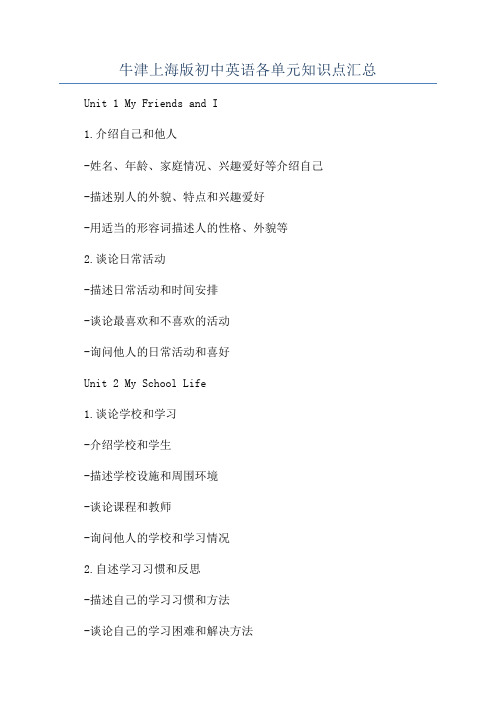
牛津上海版初中英语各单元知识点汇总Unit 1 My Friends and I1.介绍自己和他人-姓名、年龄、家庭情况、兴趣爱好等介绍自己-描述别人的外貌、特点和兴趣爱好-用适当的形容词描述人的性格、外貌等2.谈论日常活动-描述日常活动和时间安排-谈论最喜欢和不喜欢的活动-询问他人的日常活动和喜好Unit 2 My School Life1.谈论学校和学习-介绍学校和学生-描述学校设施和周围环境-谈论课程和教师-询问他人的学校和学习情况2.自述学习习惯和反思-描述自己的学习习惯和方法-谈论自己的学习困难和解决方法-做学习计划和目标-给他人学习建议和鼓励Unit 3 At Home1.描述家庭和住所-描述自己的家庭成员和住所-谈论家庭活动和责任分工-询问他人的家庭和住所情况2.谈论房间和家居用品-描述自己的房间和家居用品-谈论喜欢和不喜欢的房间和家具-询问他人的房间和家居用品情况Unit 4 Out and About1.指路和交通方式-描述如何去其中一地方-描述不同的交通方式-询问他人如何到达其中一地方2.谈论购物和交易-描述购物的地点和方式-询问商品的价格和数量-谈论交易的方式和经验Unit 5 Food and Drinks1.描述食物和饮品-描述不同种类的食物和饮品-询问食物和饮品的口味和偏好-谈论不同的饮食习惯和习惯-谈论对食物和饮品的看法和建议2.谈论饮食习惯和健康-描述自己的饮食习惯和健康问题-谈论健康生活方式和饮食习惯Unit 6 Hobbies1.介绍兴趣爱好和活动-描述自己和他人的兴趣爱好和活动-询问他人的兴趣爱好和活动2.谈论喜欢的体育运动-谈论自己喜欢的体育运动和运动员-询问他人喜欢的体育运动和运动员-谈论体育运动的好处和意义Unit 7 Holidays1.描述假期活动和旅行-描述过去和将来的假期活动-描述旅行的目的地、交通方式和活动-询问他人的假期活动和旅行计划2.谈论文化活动和习俗-描述不同的文化活动和习俗-谈论自己参与过的文化活动和习俗-询问他人的文化活动和习俗Unit 8 In Town1.描述城市景点和地标-描述自己所在的城市景点和地标-谈论旅游的经历和感受-询问他人所在城市的景点和地标2.指导他人如何参观和游玩-描述参观和游玩的流程和方式-给他人参观和游玩的建议和指导-询问他人参观和游玩的经验和意见Unit 9 Weather1.描述天气和季节-描述不同季节的天气和气候-谈论喜欢和不喜欢的天气和季节-询问他人所在地和将要去的地方的天气情况2.谈论天灾和自然现象-描述不同的天灾和自然现象-谈论对天灾和自然现象的了解和防范Unit 10 Out in Nature1.谈论动物和植物-描述不同种类的动物和植物-询问动物和植物的特点和习性-谈论对动物和植物的保护和关注2.描述户外活动和自然景观-描述自己喜欢和参与过的户外活动和自然景观-询问他人喜欢和参与过的户外活动和自然景观。
初中英语各分册语法汇总(上海牛津版)

上海初中语法点汇总(牛津版)牛津七年级第一学期Language:Module 1 RelationshipsUnit 1 Relatives in Beijing►1 形容词用于人物或事物之间比较的方法►2 运用名词和副词来表示方位►3 以how开头的疑问句4 能熟练运用by引导的介词词组表达交通方式5 学会使用表示方位的介词6 学会使用表示时间的介词7 学会运用hundred,thousand和million来表示数量Unit 2 Our animal friends►1 用以wh- 开头的特殊疑问句进行提问►2 用祈使句表示命令►3 以how开头的疑问句4 能运用一般过去时谈论过去发生的事情或动作5 掌握用代词one指代之前提到过的人或物6 掌握用prefer表示偏好的用法7 掌握用need to表示需要的用法Unit 3 Friends from other countries►1介词near和far away from的用法►2现在完成时的用法►3 用以wh- 开头的特殊疑问句进行提问4 知道over表示“超过”5 了解不同的国名和国籍的表达方式6 掌握用there be句型表示客观存在7 掌握描述人物各类信息的有关名词Module 2 My neighbourhoodUnit 4 Jobs people do►1 yes/no 问句(一般疑问句的结构)►2 一般现在时的用法► 3 用以wh- 开头的特殊疑问句进行提问► 4 一般过去时态5 熟练一些职业名词6 学会用有关副词表示事情发展的先后顺序7 熟悉work搭配不同介词的用法8 掌握both的使用方法Unit 5 Choosing a new flat►1 方位介词和介词词组的用法►2 祈使句3 掌握用too加上形容词表示“太。
”的用法4 掌握need后面直接加名词表示“需要”的用法5 学会用某些副词修饰形容词的比较级6 了解形容词最高级的用法Unit 6 Different places►1 现在进行时的用法►2 掌握when引导时间状语从句的用法►3 学会运用because引导的原因状语从句► 4 there be► 5 用以wh- 开头的特殊疑问句进行提问6 掌握“it takes + 时间”的句型7 掌握“it is + 形容词+ to do ...”的句型8 掌握乘坐交通工具的两种用法: by...,take the...9 掌握some,any,much, a lot of的用法Unit 7 Signs around us►1 掌握情态动词can和must在本单元中的用法► 2 用以wh- 开头的特殊疑问句进行提问3 了解turn作名词和动词的用法4 了解land作名词和动词的用法5 学会用“what kind of + 名词”询问种类Module 3 Diet and healthUnit 8 Growing healthy, growing strong►1 掌握so/ neither引导的倒装句►2 连词if的用法►3 情态动词: used to的用法►4 学会使用数量词5 学会用shall we和let's等表示建议6 掌握less, fewer和more的用法7 学会用not... any longer表示“不再”Unit 9 International food festival► 1 用以wh- 开头的特殊疑问句进行提问► 2 How 引导的问句► 3 一般过去时态► 4 祈使句5 了解一些国名的形容词形式6 学会用how much询问价格7 掌握动词hope的用法8 掌握句型what do you think about ... ?的用法9 熟悉词组hear from意思和用法Unit 10 A birthday party►1 一般将来时be going to的用法► 2 时间副词: firstly► 3 情态动词: would like4 掌握常见的电话用语5 学会用一般现在时表示将来6 学会感官动词后加形容词的用法7 掌握would rather do something的用法8 掌握need to do something的用法Unit 11 My food project► 1 用以wh- 开头的特殊疑问句进行提问► 2 How 引导的问句3掌握两个动词词组get ... From ...和get...to...的用法4掌握freeze和frozen的用法5 掌握“keep something + 形容词”的用法牛津七年级第二学期Language:Module 1 Garden City and its neighboursUnit 1 Writing a travel guide►1情态动词: can (ability)的用法►2由if引导的条件状语从句的用法: If you go to ..., you will find/see... ► 3 Wh- 问句: What would...?4 能够熟练运用表示方位的介词5 学习现在完成时的用法6 学习“one of +形容词最高级+ 复数名词”的句型7 学会使用so引导的结果状语从句Unit 2 Going to see a film►1 介词into和along的用法► 2 用连词so和neither引导的倒装句3 掌握用句型it's a/an...about...来描述事物的用法4学会运用表示建议的句型5 能够运用表示先后顺序的副词6 学会使用指引方向的短语Unit 3 A visit to Garden City►1现在完成时中for和since的用法► 2 现在完成时的用法3 学会使用反意疑问句4 掌握各种职业名称并了解其工作内容5 掌握be used for doing sth的用法Unit 4 Let's go shopping► 1一般现在时态► 2 用介词短语和形容词来描述物品4 掌握句型“where will we go to buy...?”的用法5 掌握need作实义动词时的用法6 学会不定代词的用法7 掌握英语中描述衣物特征的说法8 学会英语中不同尺码的表达Module 2 Better futureUnit 5 What can we learn from others?► 1 连词Although..., ...2 掌握一般过去时的用法3 掌握让步状语从句的用法4 学习other, the other, others, the others等不定代词的用法5 了解频度副词在句中的位置Unit 6 Hard work for a better life► 1 用形容词描述事件► 2 动名词: start growing/waking up/falling3 学习动名词和动词不定式的用法4 掌握句型it's + 形容词+ to do sth的用法5学习时间状语从句的用法6 掌握形容词和副词的用法Unit 7 in the future► 1 能熟练运用i think so /i don't think so等来表达同意或不同意► 2 将来时态: will,be able to3 掌握句型“what do you think will happen ... ?”4 掌握hope的用法5 学习用“in + 一段时间”表示将来时间的用法6 掌握be able to的用法Unit 8A more enjoyable school life►1反身代词的用法代词: e.g. Myself, yourself► 2 情态动词: would3 掌握句型“what changes would you like to see ... ?”的用法4 学会使用“what do you think of ... ?”的句型5 复习less, fewer的用法Module 3 The natural elementsUnit 9 The wind is blowing► 1形容词比较级: e.g.bigger, 并用比较级描述人物► 2 表示先后顺序的副词► 3 物主代词,:e.g.mine, yours4 掌握形容词的最高级的用法5 掌握不定代词的用法6 学习祈使句的用法Unit 10 Water Festival► 1 连词:when► 2介词: at, near► 3祈使句: e.g. No ball game.4 复习时间状语从句的用法5 掌握被动语态的用法6 学会no后面加动名词的用法7 掌握情态动词must的用法Unit 11 Electricity► 1 Wh- 问句: what/where/why ...?► 2 How引导的问句: How many ... ?3 掌握see的两种用法4 掌握不定代词none的用法5 复习表达花销的方式6 复习家用电器的名称牛津八年级第一学期Chapter 1 A letter from a pen-friend►1 以what, where, when, how old, how many等开头的特殊疑问句的用法; answers►2不定冠词a和an的用法3 定语从句4 重点生词:ambition, enclose等5 重点词组:enjoy doing... 喜欢做play chess 下象棋be keen on 热衷于6 培养通过上下文语境猜测生词词义的能力7 认识工具书,并学会用字母表顺序排列单词的用法8 学习书信写作的格式,书信内容的表达Chapter 2 A day in the life of ... Whiz-kid wendy►1根据所给材料用一般现在时态谈论某人的一天► 2 程度副词和短语3 重点词组:(be) responsible for 负责4 重点句型:(not) old enough to do... 不够年长而不能做......5 掌握at, in ,on作介词表时间时的用法6 了解更多有关职业的词汇7 学习always, usually, often, sometimes, seldom, never等副词在一般现在时态中的用法8 掌握在疑问句,礼貌用语中语气的变化9 根据所给材料用一般现在时态谈论某人的一天Chapter 3 Dealing with trouble►1 学会描述过去发生的事情►2 复习动词过去式,过去分词,掌握一般过去时的用法3 重点单词:argument, through, aboard, watch, dial, robbery, detail等4 重点词组:shout at 对......大叫stare at 盯着看hurry aboard 匆匆上船in handcuffs 带着手铐5 学会以字母表顺序查阅字典Chapter 4 Numbers: Everyone's language►1 学习用英语方法表述数字的写法和读法►2 学习用英语方法表述数学中的加,减,乘,除► 3 用祈使句表达命令和指示4 重点单词:system, invent, calculate, electronic, program, instruction等5 重点词组:in tens 十进制consist of 由......组成6 重点句型:so ... That ...如此......以至......7 学习几个国家名及其相应的词性变化Chapter 5 Look it up!►1 学会说出物品的制作材料► 2 指示代词► 3 可数和不可数名词4 重点单词:harmful (adj)有害的—harmless (adj) 无害的mouse (n) 老鼠—mice (pl) 老鼠amuse (v)引起乐趣—amusement (n) 娱乐think (v) 思想—thinker(n) 思想家create (v) 创造—creative(adj) 有创造力的5 重点词组:see somebody doing something看见某人正在做某事6 复习hundred, thousand的使用方法7 学会使用百科全书Chapter 6 Nobody wins ( Part I )►1熟练运用一般将来时,注意一般将来时的两种情况(be going to/ will)及其时间状语►2学会描述将来要发生的事情3 重点词组:run out of 用法at dawn 在凌晨roar with laughter 大笑着吼道4重点句型:it is true that ..........是真实的5 词性变化:lose (v)丢失—lost (adj) 丢失的,迷路的explore (v) 开发—unexplored(adj) 未探索过的6 学会直接或婉转地表达自己的意愿7 能熟练地应对how, what, why等特殊疑问句,并发挥想象力,表达自己的感想Chapter 7 Nobody wins ( Part II)►1不定代词some, any, somebody, someone和something等复合不定代词的用法► 2 方位介词3 重点词组:lie down on the bed躺在床上fall asleep入睡escape from逃离。
牛津上海版初中英语各单元知识点
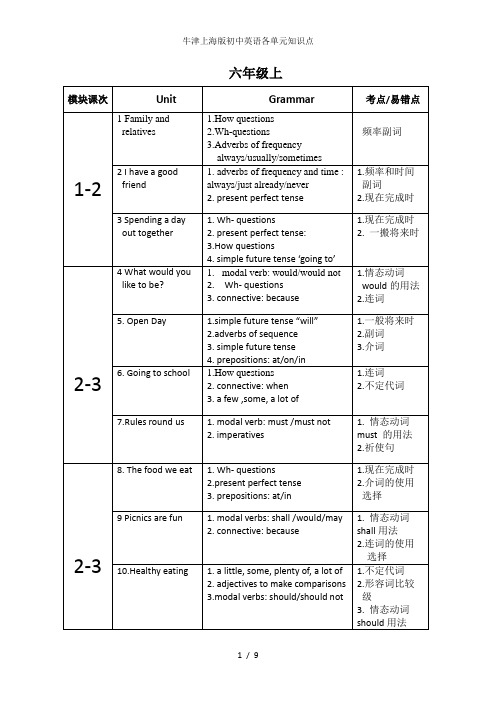
六年级上
重点:介词:at, on, in,情态动词:would, must, shall,一般将来时,现在完成时,不定代词:a few, some, a lot of
六年级(下)
一.共分为11个单元,各单元内容为:
六年级下
重点:情态动词用于情景交际,介词:for, if, with, from,there be句型,一般将来时
七年级(上)
一.共分为11个单元,各单元内容为:
七年级上
重点:祈使句,方位介词,副词,现在完成时,so/neither句型
七年级(下)
一.共分为11个单元,各单元内容为:
七年级下
重点:介词的使用,代词:物主代词,反身代词,形容词,现在完成时
八年级(上)
一.共分为7个单元,各单元内容为:
八年级上
重点:一般过去时,可数不可数名词,基数词,序数词,过去分词作状语
八年级(下)
一.共分为7个单元,各单元内容为:
八年级下
重点:连词and but so的使用,状语从句,宾语从句,should/ought to句型,情态动词的用法,现在进行时
九年级(上)
一.共分为7个单元,各单元内容为:
九年级上
重点:不定式的用法,形容词副词的比较级,现在完成时
九年级(下)
一.共分为5个单元,各单元内容为:
九年级下
重点:定语从句,状语从句,间接引语,过去进行时,过去完成时。
沪教版牛津英语初中知识点汇总表
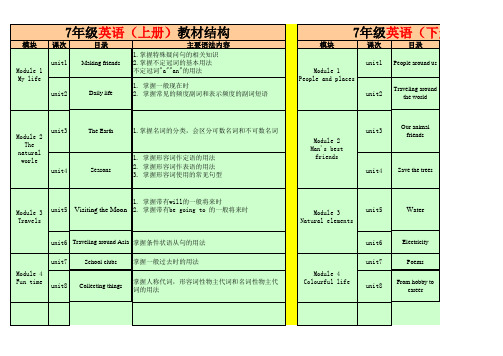
Module 3 Leisure
time
unit5 unit6
Module 4 The
unit7
Adventures of Tom
unit8
Action!
Healthy diet The Adventures of
Tom Sawyer Surprise endings
状语从句-初中9大状语从句
宾语从句 1. 分词做定语 2. 定语从句 介词
9年级英语(上册)教材结构
模块 课次
Module 1 Geniuses
unit1 unit2
目录
Wise men in history
Great minds
主要语法内容 1.listen to, hear, watch, see, notice, observe..+do/ doing的区别 2.重点语法---反意疑问句
模块
Module 1 My life
7年级英语(上册)教材结构
课次
目录
主要语法内容
unit1
Making friends
1.掌握特殊疑问句的相关知识 2.掌握不定冠词的基本用法 不定冠词"a""an"的用法
unit2
Daily life
1. 掌握一般现在时 2. 掌握常见的频度副词和表示频度的副词短语
1. 掌握“It's +形容词+for+名词、代词+动 词不定式”的结构 2. 掌握“形容词+enough+动词不定式”的结 构 3.掌握“it is +形容词+of+名词、代词+动词
1.掌握常见的方式副词及其用法 2.掌握副词的比较级和最高级
(完整word版)牛津上海版英语八上各单元知识点
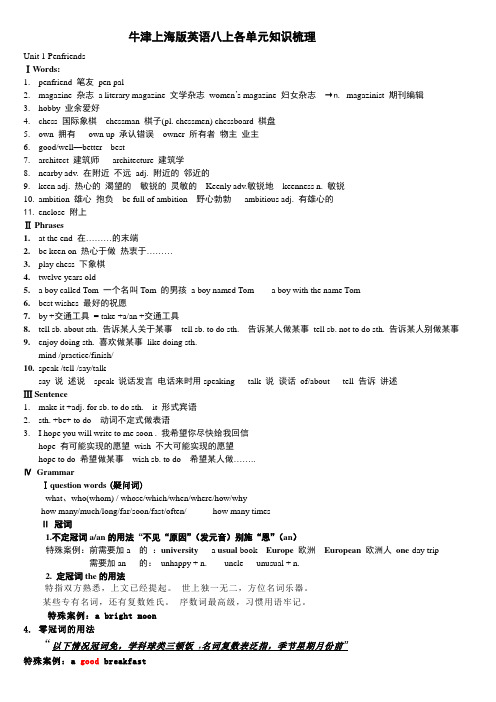
牛津上海版英语八上各单元知识梳理Unit 1 PenfriendsⅠWords:1.penfriend 笔友pen pal2.magazine 杂志a literary magazine 文学杂志women’s magazine 妇女杂志→n. magazinist 期刊编辑3.hobby 业余爱好4.chess 国际象棋chessman 棋子(pl. chessmen) chessboard 棋盘5.own 拥有own up 承认错误owner 所有者物主业主6.good/well—better---best7.architect 建筑师architecture 建筑学8.nearby adv. 在附近不远adj. 附近的邻近的9.keen adj. 热心的渴望的敏锐的灵敏的Keenly adv.敏锐地keenness n. 敏锐10.ambition 雄心抱负be full of ambition 野心勃勃ambitious adj. 有雄心的11.enclose 附上Ⅱ Phrases1.at the end 在………的末端2.be keen on 热心于做热衷于………3.play chess 下象棋4.twelve years old5. a boy called Tom 一个名叫Tom 的男孩a boy named Tom a boy with the name Tom6.best wishes 最好的祝愿7.by +交通工具= take +a/an +交通工具8.tell sb. about sth. 告诉某人关于某事tell sb. to do sth. 告诉某人做某事tell sb. not to do sth. 告诉某人别做某事9.enjoy doing sth. 喜欢做某事like doing sth.mind /practice/finish/10.speak /tell /say/talksay 说述说speak 说话发言电话来时用speaking talk 说谈话of/about tell 告诉讲述Ⅲ Sentence1.make it +adj. for sb. to do sth. it 形式宾语2.sth. +be+ to do 动词不定式做表语3.I hope you will write to me soon . 我希望你尽快给我回信hope 有可能实现的愿望wish 不大可能实现的愿望hope to do 希望做某事wish sb. to do 希望某人做……..ⅣGrammarⅠquestion words (疑问词)what、who(whom) / whose/which/when/where/how/whyhow many/much/long/far/soon/fast/often/ how many timesⅡ冠词1.不定冠词a/an的用法“不见“原因”(发元音)别施“恩”(an)特殊案例:前需要加a 的:university a usual book Europe 欧洲European欧洲人one-day trip 需要加an 的:unhappy + n. uncle unusual + n.2. 定冠词the的用法特指双方熟悉,上文已经提起。
沪教版牛津英语知识点汇总

沪教版⽜津英语知识点汇总Module1Unit1⼀,核⼼词汇第⼀第⼆第三第四第五第六派对,聚会开始带来穿着最喜欢的⼆,词组1. at Peter’s birthday party在Peter的⽣⽇聚会上2. on the 19th of September在9⽉19⽇Sunday在周⽇4.at two o’clock在两点 5. in the afternoon在下午6. at night在晚上7. sb. be tired某⼈很累8. my favourite color我最喜欢的颜⾊9. That sounds interesting.那听上去有趣10. I can’t wait!我等不及了!11. Happy Birthday!⽣⽇快乐12. Welcome to my party.欢迎来我的派对13. a pair of orange trousers⼀条橙⾊的裤⼦14. make a birthday invitation制作⼀张⽣⽇请帖15. make a hat制作⼀顶帽⼦16. have some fun过得⾼兴17. birthday present⽣⽇礼物三,词汇解释,take,carry辨析bring是指把⼈或物从别处带到说话⼈所在的地⽅。
例如:Bring me some water, please.请给我取点⽔来。
carry及物动词,“搬运,运送”,⼀般是指搬运较重的物品。
例如:carry a box on one’s shoulder扛着箱⼦carry a baby on one’s back背着孩⼦“携带,带”例如:Almost every teacher carries a watch.差不多每位教师都带着⼀只表。
I never carry much money about me.我⾝边不带许多钱。
How many kilograms of luggage can I carry with me我随⾝可以带多少公⽄⾏李take是指把⼈或物从说话⼈的地⽅带到别处去。
初中英语 牛津上海版九年级上Unit4知识点及语法点

U4一、同步知识梳理1) knowledge n. 知识→ know (knew, known) v. 了解;知道;认识2) calculator n.计算器→ calculate v. 计算3) importantly adv. 重要地→ important adj. 重要的→importance n. 重要性4) meaning n. 意思→ mean (meant, meant) v. 意味着;意思是;表示……的意思5) able adj. 能够的;有能力的→ unable adj. 无能的enable v. 使......能够ability n. 能力;才能6) interesting adj. 有趣的→ interested adj. 感兴趣的interest n. 兴趣;趣味7) life n. 生命→ lives pl.8) write v. 写→ writer n. 作家writing n. 文章;著作非考纲词汇9) unaware adj. 没意识到;未察觉→ aware adj. 意识到;察觉●(be) unaware of/(be) aware of 没意识到;未察觉/意识到;察觉10) probably adv. 可能地→ probable adj. 可能的11) rarely adv. 罕有;很少;不常→ rare adj. 罕有的重要知识点1.helper n. = 助手;帮手= assistant n.助手help n./ v. 帮助;帮忙helpful a. 有益的;有帮助的helpless adj.无用的,无帮助的with the help of 在……的帮助下练习:①________ the help of the teacher, my son has made great progress in English.A) By B) Under C) On D) With② Dictionary is a great_________ for us, it’s useful( help)D helper2.depend on = rely on 依靠,依赖depend (v.) 依靠,依赖dependent (adj.)依靠的、依赖的练习:①Whether our school will go to the amusement park next week depends_______ the weatherA .about B. on C. of D. in②Don’t __________too much on your parents. Try to deal with problems yourselves.(independent)③Kevin is so independent that he always tries to do everything by . (he)④ We have grown up. We can’t depend too much our parents.A. withB. onC. byD. inB depend himself B3 rarely adv.=not often ; seldom 很少的;罕见的练习:①People in western countries rarely talk loudly in public. (改为反意疑问句)People in western countries rarely talk loudly in public, _______ _______?②Mary’s father rarely smokes in public places, ?A) does he B) doesn’t he C) is he D) isn’t he③ Computers rarely give wrong answers,__________?A.do theyB. don't theyC. does itD.doesn't itdo they A Aimportantly adv. = having great value or influence 重大地important a. 重要的;重大的importance n. 重要性练习:①More and more people have realized the ___________ of saving water. (important)②More________, you should read more to improve your reading skills. (important)importance, importantlyoperate v.操作;运转;动手术operate on sb. 给某人动手术operation n.操作、手术练习:①The shop assistant showed me how to _____ the digital camera. (operation)②Doctor Lin left in a hurry to __________on a wonderful young man just now .(operation )③Amy's job is to __________ the new machine that was bought last week. (operation)④ Doctor Li is busy (operation) on a boy who was injured in a car accident.operate, operate, operate, operating6. common "常见的,不足为奇的”common knowledge 众所周知;常识练习:①_________is common knowledge that the sun rises in the east and falls in the westA.That B. What C. It D. Which②It is common (know) that smoking is harmful to our health.C knowledge7. for the time being 暂时用于一般现在吋练习:①The boy goes over his lessons until mid-night from time to time. The underlined part means ___________.A. sometimesB. in timeC. on timeD. forthe time being②More and more foreigners are living and working in Shanghai at present. The underlined part means “______”.A) at a time B) for the time being C) just now D) from time to time③This is the only material Tom can find for the time being. (保持句意基本不变)This is the only material Tom can find_______ _______.A B at present8. be unaware of 未注意到be aware of 注意到aware adj 知道的,意识到的unaware adj. 不知道的,没有意识到的练习:①Now more and more people are of the danger of driving after drinking alcohol(酒). (unaware)②Some kinds of computers are so tiny that people may be ________of them. (aware)③He was unaware of the mistakes he made in the report. The underlined part means ________.A. didn’t think aboutB. didn’t seeC. didn’t knowD. didn’t wantaware, unaware, C9.able( adj. )有能力的enable (v.) 使……能够ability(n. ) 能力练习:①John has the of managing everything on the show. (able)②I gave him full directions to ____________ him to find the house. (able)③Although Michael is only six, he has already shown his _______ to draw pictures. (able)④ The newly-built bridge will ________ the citizens to cross the river more conveniently.(able)ability, enable, ability, enableII.重要语法:形容词、副词比较级和最高级有规则变化和不规则变化A. 规则变化(1)一般情况下,单音节或双音节的形容词(或副词)比较级+er ,最高级+estclever-cleverer-cleverest , few-fewer-fewest , small-smaller -smallest等(2)以e结尾的词,比较级+r,最高级+st即可nice-nicer-nicest, cute-cuter-cutest, large-larger-largest (3)以辅音字母+y结尾的变y为i+er或esteasy-easier-easiest, happy-happier-happiest, 再如:early , busy , heavy , dirty , lazy . 也如此(4)双写最后一个辅音字母+er或est的词同学要用心去记。
上海(牛津版)初中英语语言点及语法总结

There be
Wh-questions
Present continuous tense
Connectives: when, because
Pronoun: it
Simple present tense
7. Signs around us (P48)
Signs and rules
6 Going to school(P39)
Travelling time to school
Simon’s way to school
How questions
Connective: when
Afew, some, a lot of
重点是a few, some a lot of等修饰数量的限定词的用用法
重点是现在完成时态的概念理解和简单运用
3Spend a day out together(P16)
Green island
Wh-questions
Present perfect tense
How-questions
Simple future tense“going to”
重点是现在完成时的运用以及一般将来时的特殊形式“going to”的运用
Module
Unit
Reading
LanguagePoints
Remarks
1 City life
1 Great cities in Asia(P2)
Great cities in Asia(P4)
How questions
Preposition: by
Gerund: like/enjoy/love doing
Indoor and outdoor activities(P21)
- 1、下载文档前请自行甄别文档内容的完整性,平台不提供额外的编辑、内容补充、找答案等附加服务。
- 2、"仅部分预览"的文档,不可在线预览部分如存在完整性等问题,可反馈申请退款(可完整预览的文档不适用该条件!)。
- 3、如文档侵犯您的权益,请联系客服反馈,我们会尽快为您处理(人工客服工作时间:9:00-18:30)。
六年级上
重点:介词:at, on, in,情态动词:would, must, shall,一般将来时,现在完成时,不定代词:a few, some, a lot of
六年级(下)
一.共分为11个单元,各单元内容为:
六年级下
重点:情态动词用于情景交际,介词:for, if, with, from,there be 句型,一般将来时
七年级(上)
一.共分为11个单元,各单元内容为:
七年级上
重点:祈使句,方位介词,副词,现在完成时,so/neither 句型
七年级(下)
一.
共分为11个单元,各单元内容为: 七年级下
重点:介词的使用,代词:物主代词,反身代词,形容词,现在完成时
八年级(上)
一.共分为7个单元,各单元内容为:
八年级上
重点:一般过去时,可数不可数名词,基数词,序数词,过去分词作状语
八年级(下)
一.共分为7个单元,各单元内容为:
八年级下
重点:连词and but so的使用,状语从句,宾语从句,should/ought to句型,情态动词的用法,现在进行时
九年级(上)
一.共分为7个单元,各单元内容为:
九年级上
重点:不定式的用法,形容词副词的比较级,现在完成时
九年级(下)
一.共分为5个单元,各单元内容为:
九年级下
重点:定语从句,状语从句,间接引语,过去进行时,过去完成时。
